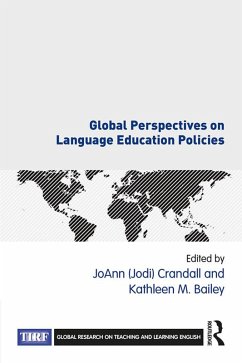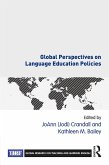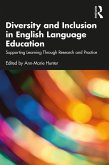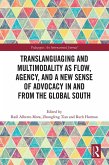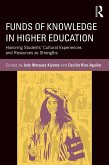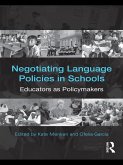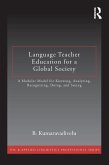Global Perspectives on Language Education Policies (eBook, PDF)
Redaktion: Crandall, Joann (Jodi); Bailey, Kathleen M.
46,95 €
46,95 €
inkl. MwSt.
Sofort per Download lieferbar

23 °P sammeln
46,95 €
Als Download kaufen

46,95 €
inkl. MwSt.
Sofort per Download lieferbar

23 °P sammeln
Jetzt verschenken
Alle Infos zum eBook verschenken
46,95 €
inkl. MwSt.
Sofort per Download lieferbar
Alle Infos zum eBook verschenken

23 °P sammeln
Global Perspectives on Language Education Policies (eBook, PDF)
Redaktion: Crandall, Joann (Jodi); Bailey, Kathleen M.
- Format: PDF
- Merkliste
- Auf die Merkliste
- Bewerten Bewerten
- Teilen
- Produkt teilen
- Produkterinnerung
- Produkterinnerung

Bitte loggen Sie sich zunächst in Ihr Kundenkonto ein oder registrieren Sie sich bei
bücher.de, um das eBook-Abo tolino select nutzen zu können.
Hier können Sie sich einloggen
Hier können Sie sich einloggen
Sie sind bereits eingeloggt. Klicken Sie auf 2. tolino select Abo, um fortzufahren.

Bitte loggen Sie sich zunächst in Ihr Kundenkonto ein oder registrieren Sie sich bei bücher.de, um das eBook-Abo tolino select nutzen zu können.
The fifth volume in the Global Research on Teaching and Learning English series, this book brings readers up-to-date on the latest developments in research, theory, and practice in a rapidly changing field, presenting research on language policy and planning, with a special focus on educational contexts in which English plays a role.
- Geräte: PC
- mit Kopierschutz
- eBook Hilfe
- Größe: 1.6MB
Andere Kunden interessierten sich auch für
![Global Perspectives on Language Education Policies (eBook, ePUB) Global Perspectives on Language Education Policies (eBook, ePUB)]() Global Perspectives on Language Education Policies (eBook, ePUB)46,95 €
Global Perspectives on Language Education Policies (eBook, ePUB)46,95 €![Creating Classrooms of Peace in English Language Teaching (eBook, PDF) Creating Classrooms of Peace in English Language Teaching (eBook, PDF)]() Creating Classrooms of Peace in English Language Teaching (eBook, PDF)40,95 €
Creating Classrooms of Peace in English Language Teaching (eBook, PDF)40,95 €![Diversity and Inclusion in English Language Education (eBook, PDF) Diversity and Inclusion in English Language Education (eBook, PDF)]() Diversity and Inclusion in English Language Education (eBook, PDF)29,95 €
Diversity and Inclusion in English Language Education (eBook, PDF)29,95 €![Translanguaging and Multimodality as Flow, Agency, and a New Sense of Advocacy in and from the Global South (eBook, PDF) Translanguaging and Multimodality as Flow, Agency, and a New Sense of Advocacy in and from the Global South (eBook, PDF)]() Translanguaging and Multimodality as Flow, Agency, and a New Sense of Advocacy in and from the Global South (eBook, PDF)52,95 €
Translanguaging and Multimodality as Flow, Agency, and a New Sense of Advocacy in and from the Global South (eBook, PDF)52,95 €![Funds of Knowledge in Higher Education (eBook, PDF) Funds of Knowledge in Higher Education (eBook, PDF)]() Funds of Knowledge in Higher Education (eBook, PDF)42,95 €
Funds of Knowledge in Higher Education (eBook, PDF)42,95 €![Negotiating Language Policies in Schools (eBook, PDF) Negotiating Language Policies in Schools (eBook, PDF)]() Negotiating Language Policies in Schools (eBook, PDF)54,95 €
Negotiating Language Policies in Schools (eBook, PDF)54,95 €![Language Teacher Education for a Global Society (eBook, PDF) Language Teacher Education for a Global Society (eBook, PDF)]() B. KumaravadiveluLanguage Teacher Education for a Global Society (eBook, PDF)51,95 €
B. KumaravadiveluLanguage Teacher Education for a Global Society (eBook, PDF)51,95 €-
-
-
The fifth volume in the Global Research on Teaching and Learning English series, this book brings readers up-to-date on the latest developments in research, theory, and practice in a rapidly changing field, presenting research on language policy and planning, with a special focus on educational contexts in which English plays a role.
Dieser Download kann aus rechtlichen Gründen nur mit Rechnungsadresse in A, B, BG, CY, CZ, D, DK, EW, E, FIN, F, GR, HR, H, IRL, I, LT, L, LR, M, NL, PL, P, R, S, SLO, SK ausgeliefert werden.
Produktdetails
- Produktdetails
- Verlag: Taylor & Francis eBooks
- Seitenzahl: 262
- Erscheinungstermin: 1. Februar 2018
- Englisch
- ISBN-13: 9781351610018
- Artikelnr.: 54144302
- Verlag: Taylor & Francis eBooks
- Seitenzahl: 262
- Erscheinungstermin: 1. Februar 2018
- Englisch
- ISBN-13: 9781351610018
- Artikelnr.: 54144302
- Herstellerkennzeichnung Die Herstellerinformationen sind derzeit nicht verfügbar.
JoAnn ( Jodi) Crandall is Professor Emerita of Education at the University of Maryland, Baltimore County, USA. She is a past president of TESOL, WATESOL, and AAAL, and a founding and current member of the TIRF Board of Trustees. Kathleen M. Bailey is Professor of Applied Linguistics in the TESOL/TFL Programs at the Middlebury Institute of International Studies at Monterey and at Anaheim University, USA. She is a past president of both TESOL and AAAL, as well as the current president of TIRF.
Foreword by Joseph Lo Bianco. Preface 1. Introduction Part 1: The Teacher
as Language Planner and Policy Maker 2. Whither Mother-tongue (in)
Education?: An Ethnographic Study of Language Policy in Rural Primary
Schools in Pakistan 3. Agentic Responses to Communicative Language Teaching
in Language Policy: An Example of Vietnamese English Primary Teachers 4.
Examining Brazilian Foreign Language Policy and its Application in an EFL
University Program: Teacher Perspectives on Plurilingualism 5. Refugee
Women in the United States Writing Themselves into New Community Spaces
Part 2: Adoption or Adaptation of Educational Language Policies by/in
Institutions 6. Policy Borrowing in University Language Planning: A Case of
Writing Centers in Japan 7. Economic Markets, Elite Multilingualism, and
Language Policy in Nepali Schools 8. Linguistic Diversity and the Politics
of International Inclusion: Challenges in Integrating International
Teaching Assistants at a University in the United States 9. Official and
Realized Hiring Policy of Assistant Language Teachers in Japan Part 3:
Perspectives of Diverse Stakeholders on Educational Language Policy and
Planning 10. Policy and Practicality in Timorese Higher Education: Lessons
from Lecturers in Development-related Disciplines 11. The Absence of
Language-Focused Teacher Education Policy in U.S. K12 Contexts: Insights
from Language Socialization Research in a Ninth-grade Physics Classroom 12.
Bilingualism for All?: Interrogating Language and Equity in Dual Language
Immersion in Wisconsin 13. Media Discourses of Language Policy and the
"New" Latino Diaspora in Iowa Part 4: Identity and Individual and
"Invisible" Language Policy and Planning 14. Rethinking Culturally and
Linguistically Diverse Students' Perceptions of Family Language Policies
and Identities in an American Afterschool Program 15. Digital Literacy,
Language Learning, and Educational Policy in British Columbia 16. Small
Stories of/in Changing Times in Paraguay: A Resource for Identity Work in
Language Policy Appropriation 17. Challenges of Language Education Policy
Development and Implementation in Creole-speaking Contexts: The Case of
Jamaica 18. Summary and Concluding Observations
as Language Planner and Policy Maker 2. Whither Mother-tongue (in)
Education?: An Ethnographic Study of Language Policy in Rural Primary
Schools in Pakistan 3. Agentic Responses to Communicative Language Teaching
in Language Policy: An Example of Vietnamese English Primary Teachers 4.
Examining Brazilian Foreign Language Policy and its Application in an EFL
University Program: Teacher Perspectives on Plurilingualism 5. Refugee
Women in the United States Writing Themselves into New Community Spaces
Part 2: Adoption or Adaptation of Educational Language Policies by/in
Institutions 6. Policy Borrowing in University Language Planning: A Case of
Writing Centers in Japan 7. Economic Markets, Elite Multilingualism, and
Language Policy in Nepali Schools 8. Linguistic Diversity and the Politics
of International Inclusion: Challenges in Integrating International
Teaching Assistants at a University in the United States 9. Official and
Realized Hiring Policy of Assistant Language Teachers in Japan Part 3:
Perspectives of Diverse Stakeholders on Educational Language Policy and
Planning 10. Policy and Practicality in Timorese Higher Education: Lessons
from Lecturers in Development-related Disciplines 11. The Absence of
Language-Focused Teacher Education Policy in U.S. K12 Contexts: Insights
from Language Socialization Research in a Ninth-grade Physics Classroom 12.
Bilingualism for All?: Interrogating Language and Equity in Dual Language
Immersion in Wisconsin 13. Media Discourses of Language Policy and the
"New" Latino Diaspora in Iowa Part 4: Identity and Individual and
"Invisible" Language Policy and Planning 14. Rethinking Culturally and
Linguistically Diverse Students' Perceptions of Family Language Policies
and Identities in an American Afterschool Program 15. Digital Literacy,
Language Learning, and Educational Policy in British Columbia 16. Small
Stories of/in Changing Times in Paraguay: A Resource for Identity Work in
Language Policy Appropriation 17. Challenges of Language Education Policy
Development and Implementation in Creole-speaking Contexts: The Case of
Jamaica 18. Summary and Concluding Observations
Foreword by Joseph Lo Bianco. Preface 1. Introduction Part 1: The Teacher
as Language Planner and Policy Maker 2. Whither Mother-tongue (in)
Education?: An Ethnographic Study of Language Policy in Rural Primary
Schools in Pakistan 3. Agentic Responses to Communicative Language Teaching
in Language Policy: An Example of Vietnamese English Primary Teachers 4.
Examining Brazilian Foreign Language Policy and its Application in an EFL
University Program: Teacher Perspectives on Plurilingualism 5. Refugee
Women in the United States Writing Themselves into New Community Spaces
Part 2: Adoption or Adaptation of Educational Language Policies by/in
Institutions 6. Policy Borrowing in University Language Planning: A Case of
Writing Centers in Japan 7. Economic Markets, Elite Multilingualism, and
Language Policy in Nepali Schools 8. Linguistic Diversity and the Politics
of International Inclusion: Challenges in Integrating International
Teaching Assistants at a University in the United States 9. Official and
Realized Hiring Policy of Assistant Language Teachers in Japan Part 3:
Perspectives of Diverse Stakeholders on Educational Language Policy and
Planning 10. Policy and Practicality in Timorese Higher Education: Lessons
from Lecturers in Development-related Disciplines 11. The Absence of
Language-Focused Teacher Education Policy in U.S. K12 Contexts: Insights
from Language Socialization Research in a Ninth-grade Physics Classroom 12.
Bilingualism for All?: Interrogating Language and Equity in Dual Language
Immersion in Wisconsin 13. Media Discourses of Language Policy and the
"New" Latino Diaspora in Iowa Part 4: Identity and Individual and
"Invisible" Language Policy and Planning 14. Rethinking Culturally and
Linguistically Diverse Students' Perceptions of Family Language Policies
and Identities in an American Afterschool Program 15. Digital Literacy,
Language Learning, and Educational Policy in British Columbia 16. Small
Stories of/in Changing Times in Paraguay: A Resource for Identity Work in
Language Policy Appropriation 17. Challenges of Language Education Policy
Development and Implementation in Creole-speaking Contexts: The Case of
Jamaica 18. Summary and Concluding Observations
as Language Planner and Policy Maker 2. Whither Mother-tongue (in)
Education?: An Ethnographic Study of Language Policy in Rural Primary
Schools in Pakistan 3. Agentic Responses to Communicative Language Teaching
in Language Policy: An Example of Vietnamese English Primary Teachers 4.
Examining Brazilian Foreign Language Policy and its Application in an EFL
University Program: Teacher Perspectives on Plurilingualism 5. Refugee
Women in the United States Writing Themselves into New Community Spaces
Part 2: Adoption or Adaptation of Educational Language Policies by/in
Institutions 6. Policy Borrowing in University Language Planning: A Case of
Writing Centers in Japan 7. Economic Markets, Elite Multilingualism, and
Language Policy in Nepali Schools 8. Linguistic Diversity and the Politics
of International Inclusion: Challenges in Integrating International
Teaching Assistants at a University in the United States 9. Official and
Realized Hiring Policy of Assistant Language Teachers in Japan Part 3:
Perspectives of Diverse Stakeholders on Educational Language Policy and
Planning 10. Policy and Practicality in Timorese Higher Education: Lessons
from Lecturers in Development-related Disciplines 11. The Absence of
Language-Focused Teacher Education Policy in U.S. K12 Contexts: Insights
from Language Socialization Research in a Ninth-grade Physics Classroom 12.
Bilingualism for All?: Interrogating Language and Equity in Dual Language
Immersion in Wisconsin 13. Media Discourses of Language Policy and the
"New" Latino Diaspora in Iowa Part 4: Identity and Individual and
"Invisible" Language Policy and Planning 14. Rethinking Culturally and
Linguistically Diverse Students' Perceptions of Family Language Policies
and Identities in an American Afterschool Program 15. Digital Literacy,
Language Learning, and Educational Policy in British Columbia 16. Small
Stories of/in Changing Times in Paraguay: A Resource for Identity Work in
Language Policy Appropriation 17. Challenges of Language Education Policy
Development and Implementation in Creole-speaking Contexts: The Case of
Jamaica 18. Summary and Concluding Observations
